Near the end of 1999, Google Inc. had thirty-nine employees, most of whom were engineers of one stripe or another. Omid Kordescani, Google's newly hired sales chief, was still plowing the fields for enterprise deals, but they were few and far between. With more than $500,000 (and growing) going our the door each month and less than $20 million in the bank, you didn't need a Stanford PhD to do the math: the company needed a business model that worked.
There was always the failback of simply running banners on Google's prodigious traffic — one deal with DoubleClick, an ad network that specialized in serving graphical banners, would probably net the company millions of dollars. But that felt like a sellout — DoubleClick's ads were often gaudy and irrelevant. They represented everything Page and Brin felt was wrong with the Internet "They didn't want to turn the Web site into the online version of Forty-second Street," recalls investor and director Michael Moritz.
Instead, the young executive team decided to try a more focused approach—it would sell text-only ads to sponsors targeting particular keywords. When you searched for "Ford cars," for example, an ad would appear at the top of the results for Ford Motor Company. These first advertisements were sold on a cost per thousand (CPM) model. (…)
Turns out the ads worked well enough, but they didn't scale. Revenue was limited by Kordestani's ability to sell, and despite his talents, it was difficult to book enough orders to create a healthy business. "It didn't generate much money," Brin recalls, referring to the program as a "hand-patched life preserver." DoubleClick, he adds, was the ocean liner Google would swim to should the life preserver fail.
Why There's No DoubleClick Ad on Google.com
John Battelle tells Google's story in "The Search: How Google and Its Rivals Rewrote the Rules of Business and Transformed Our Culture". An interesting episode happens in 1999, when Google still tried to find a business model and when DoubleClick's banners didn't seem the right way to make money.
Infinite Scrolling in Google Search
If you hate clicking on "next" in Google search, but you don't want to set a higher number of results in the preferences because the page loads slowly, this Greasemonkey script might be for you (requires Greasemonkey for Firefox). It loads the next page of results as you scroll down so it gives the illusion of "infinite scrolling".
This is a Japanese script as it was created by two people from Japan. One downside of the script is that it opens search results in a new window/tab, but removing that bit of code causes weird effects.
If you want a native "infinite scrolling" in Google, try SearchMash and keep pressing the space bar to automatically fetch the next results page. Microsoft's image search is also a good implementation of the concept and probably the first major search engine that used "infinite scrolling" (at first, Windows Live Search used it for web search results as well, but the feature was removed).
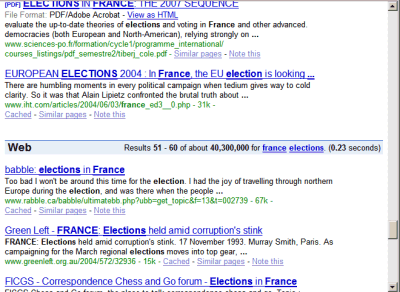
This is a Japanese script as it was created by two people from Japan. One downside of the script is that it opens search results in a new window/tab, but removing that bit of code causes weird effects.
If you want a native "infinite scrolling" in Google, try SearchMash and keep pressing the space bar to automatically fetch the next results page. Microsoft's image search is also a good implementation of the concept and probably the first major search engine that used "infinite scrolling" (at first, Windows Live Search used it for web search results as well, but the feature was removed).

Call Google 411 Wherever You Are
Google launched last week a directory assistance service that uses voice recognition to automatically answer queries about the US local businesses. The service is free, but if you're not in the US or Canada, it's not very easy to see how well it works.
Fortunately, Yahoo Messenger lets you call toll-free US numbers that start with 800, 888, 877, or 866. This is a fairly recent feature that was added in Yahoo Messenger 8.1. All you need to do is call 8004664411 and follow the directions.
Skype also offers free calls to toll-free phone numbers, but Google's number is always busy.
If you discover some interesting bugs or funny answers, record the conversation using a software like SoliCall or Audacity*, upload it to odeo and post a link in the comments.
* Most sound cards have the option to record mix that captures the output signal from wave channel AND input signal from microphone channel. In Windows XP, go to Start/Run, type sndvol32 and in Preferences toggle the "Recording" option and select "Stereo Mix" (make sure you select in the main dialog as well). Then you can record the sound using with Audacity or other audio editor.
Fortunately, Yahoo Messenger lets you call toll-free US numbers that start with 800, 888, 877, or 866. This is a fairly recent feature that was added in Yahoo Messenger 8.1. All you need to do is call 8004664411 and follow the directions.
Skype also offers free calls to toll-free phone numbers, but Google's number is always busy.
If you discover some interesting bugs or funny answers, record the conversation using a software like SoliCall or Audacity*, upload it to odeo and post a link in the comments.
* Most sound cards have the option to record mix that captures the output signal from wave channel AND input signal from microphone channel. In Windows XP, go to Start/Run, type sndvol32 and in Preferences toggle the "Recording" option and select "Stereo Mix" (make sure you select in the main dialog as well). Then you can record the sound using with Audacity or other audio editor.
Google Pays $3.1 Billion for DoubleClick


I don't know if there's a single ad blocker or cookie filtering program that doesn't include doubleclick.net in its black list. For me, DoubleClick is associated with ugly animated banners and tracking cookies. But since today, DoubleClick is a part of Google's empire and will help it expand in the display ads area, where Google failed to attract too many advertisers.
"Web advertising leader Google Inc. said on Friday it has agreed to acquire DoubleClick Inc., a top online advertising network, for $3.1 billion, beating out other major Internet players with its bid."
The major Internet player outbid by Google was Microsoft and that was probably the explanation for this huge value paid by Google for the largest and most ungoogly acquisition ever made.
"Acquiring DoubleClick expands Google's business far beyond algorithm-driven ad auctions into a relationship-based business with Web publishers and advertisers. (...) DoubleClick's exchange is different from the ad auctions that Google uses on its networks because the exchange is open to any Web publisher or ad network — not just the sites in Google’s network," notes New York Times.
But what is DoubleClick anyway?
DoubleClick is a provider of internet ad serving software. Its clients include agencies, marketers (Universal McCann Interactive, AKQA etc.) and publishers who service customers such as Microsoft, General Motors, Coca-Cola, Motorola, L'Oreal, Palm, Visa USA, Nike, Carlsberg and many more. (...)
DoubleClick was founded in 1995 as Internet Advertising Network by Kevin O'Connor and Dwight Merriman. DoubleClick was initially engaged in the online media business, meaning it helped web sites sell advertising to marketers. In 1997 the company began offering the online ad serving and management technology they had developed to other publishers as the DART services. During the internet downturn, DoubleClick divested its media business, and today DoubleClick is purely involved in ad management from the technology end — uploading ads and reporting on their performance. (...)
DoubleClick is sometimes linked with the controversy over spyware because browser cookies are set to track users as they travel from website to website and record what commercial advertisements they view and select while browsing. However, the company maintains that it is important to understand the difference between DoubleClick's ad serving tags and the spyware/adware companies.
Update. In Google's press release, Sergey Brin says:
"It has been our vision to make Internet advertising better - less intrusive, more effective, and more useful. Together with DoubleClick, Google will make the Internet more efficient for end users, advertisers, and publishers." And what about the lack of intrusiveness?
Switch from Google Maps to Google Earth
Oftentimes I find something interesting in Google Maps and want to see it more detailed in Google Earth. You could try to repeat the search in Google Earth, but that's not the best idea.
To move to the same location click on "Link to this page", go to the address bar and copy the value of the ll parameter from a Google Maps address. Then type the value in Google Earth's search box. Here's an example:
http://maps.google.com/maps?f=q&q=Paris,+France&layer=&om=1&
z=14&ll=52.046737,-0.198269&spn=0.024229,0.080338
If you want to save some clicks, after clicking "Link to this page", add "&output=kml" at the end of the URL and hit Enter. A dialog will ask you to open or save a KML file. Choose to open the file in Google Earth.
There's even a bookmarklet that automates the process. Bookmark this link or drag it to your bookmarks toolbar. Next time you want to switch to Google Earth, just click on the bookmarklet.
To move to the same location click on "Link to this page", go to the address bar and copy the value of the ll parameter from a Google Maps address. Then type the value in Google Earth's search box. Here's an example:
http://maps.google.com/maps?f=q&q=Paris,+France&layer=&om=1&
z=14&ll=52.046737,-0.198269&spn=0.024229,0.080338
If you want to save some clicks, after clicking "Link to this page", add "&output=kml" at the end of the URL and hit Enter. A dialog will ask you to open or save a KML file. Choose to open the file in Google Earth.
There's even a bookmarklet that automates the process. Bookmark this link or drag it to your bookmarks toolbar. Next time you want to switch to Google Earth, just click on the bookmarklet.
A Simplified Version of Google's Spell Checker
Peter Norvig (from Google) explains in a detailed article how to write in 20 lines of Python code a spell checker almost as good as the one used by Google to show the famous "did you mean" corrections. Well, at least for one-word corrections.
A simple way to define the error model was to say that "all known words of edit distance 1 are infinitely more probable than known words of edit distance 2, and infinitely less probable than a known word of edit distance 0". From all the candidates for the correction, you can choose the most frequent word.
In Peter Norvig's tests, this simple algorithm returned correct answers in more than 80% of the cases. Of course that Google has more data than the holmes.txt file (it crawls the web, right?) and has access to a huge list of queries and refinements that could improve the algorithm, but this is an example of a simple yet powerful program.
We will read a text file, holmes.txt (that I happened to have on my laptop) which is a collection of Sherlock Holmes stories (from Project Gutenberg) consisting of about 100,000 words. We then extract the individual words from the file (using the function words, which converts everything to lowercase, so that "the" and "The" will be the same). Next we train a probability model, which is a fancy way of saying we count how many times each word occurs. (...)
Now let's look at the problem of enumerating the possible corrections c of a given word w. It is common to talk of the edit distance between two words: the number of edits it would take to turn one into the other. An edit can be a deletion (remove one letter), a transposition (swap adjacent letters), an alteration (change one letter to another) or an insertion (add a letter). (...)
The literature on spelling correction claims that 80 to 95% of spelling errors are an edit distance of 1 from the target.
A simple way to define the error model was to say that "all known words of edit distance 1 are infinitely more probable than known words of edit distance 2, and infinitely less probable than a known word of edit distance 0". From all the candidates for the correction, you can choose the most frequent word.
In Peter Norvig's tests, this simple algorithm returned correct answers in more than 80% of the cases. Of course that Google has more data than the holmes.txt file (it crawls the web, right?) and has access to a huge list of queries and refinements that could improve the algorithm, but this is an example of a simple yet powerful program.
3D Buildings in Google's Street Maps
Google Maps adds a new dimension to buildings in the street maps of more than 30 important cities from the US (like New York or Boston) and Japan. Frank Taylor from the unofficial Google Earth Blog argues that they're not yet 3D. "You can't rotate or tilt your view, so it's 2D. But, the buildings have shaded 3D-like projections from an angle so you get an idea of height and shape of the buildings."
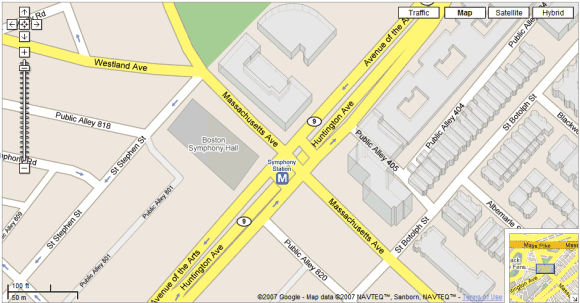
This is, in fact, Google Earth's building layer. To see it, go to the layers sidebar and enable "3D buildings".

Google Earth's layers contain a lot of useful information that enhance the satellite imagery: road names, airports, parks, populated places, pictures and more. The cool thing is that they reside on Google's servers, so you don't need to update Google Earth to see new information. Google Maps could become much more useful if it included these overlays.

This is, in fact, Google Earth's building layer. To see it, go to the layers sidebar and enable "3D buildings".

Google Earth's layers contain a lot of useful information that enhance the satellite imagery: road names, airports, parks, populated places, pictures and more. The cool thing is that they reside on Google's servers, so you don't need to update Google Earth to see new information. Google Maps could become much more useful if it included these overlays.
The Sad Story of Darfur in Google Earth
"Girl with traumatized baby sister. The baby has not made a sound since the day their parents were slaughtered and the village burned."
When you hear about sad stories from far away, they rarely touch you. It's hard to be impressed by the sufferance of someone who doesn't have too much in common with you.
The United States Holocaust Memorial Museum presents in a Google Earth layer the consequences of a conflict from Darfur, a region situated in Sudan.
BBC tells the story:
"I was living with my family in Tawila and going to school when one day the Janjaweed entered the town and attacked the school. We tried to leave the school but we heard noises of bombing in the town and started running in all directions. All the girls were scared. The Janjaweed entered the school and caught some girls and raped them in the class rooms. I was raped by four men inside the school. When they left they told us they would take care of all of us black people and clean Darfur for good."
The refugees, their destroyed villages and a disturbing story - in a Google Earth layer (requires Google Earth, obviously).

When you hear about sad stories from far away, they rarely touch you. It's hard to be impressed by the sufferance of someone who doesn't have too much in common with you.
The United States Holocaust Memorial Museum presents in a Google Earth layer the consequences of a conflict from Darfur, a region situated in Sudan.
BBC tells the story:
Sudan's government and the pro-government Arab militias are accused of war crimes against the region's black African population, although the UN has stopped short of calling it genocide. (...)
The conflict began in the arid and impoverished region early in 2003 after a rebel group began attacking government targets, saying the region was being neglected by Khartoum. The rebels say the government is oppressing black Africans in favour of Arabs. (...)
[The government] admits mobilising "self-defence militias" following rebel attacks but denies any links to the Janjaweed, accused of trying to "cleanse" black Africans from large swathes of territory. Refugees from Darfur say that following air raids by government aircraft, the Janjaweed ride into villages on horses and camels, slaughtering men, raping women and stealing whatever they can find.
"I was living with my family in Tawila and going to school when one day the Janjaweed entered the town and attacked the school. We tried to leave the school but we heard noises of bombing in the town and started running in all directions. All the girls were scared. The Janjaweed entered the school and caught some girls and raped them in the class rooms. I was raped by four men inside the school. When they left they told us they would take care of all of us black people and clean Darfur for good."
The refugees, their destroyed villages and a disturbing story - in a Google Earth layer (requires Google Earth, obviously).

Opera 9.20 - More Homepages at Your Fingertips
The latest version Opera (a free browser from Norway) brings the speed dial from your phone to your browser. You can configure a start page with nine boxes where you can add frequently visited sites. The page shows up everytime you open a new tab, but the sites added to the start page can be opened by simply clicking on Ctrl-[number from 1 to 9].
Opera shows real-time thumbnails of the selected pages and lets you reload them at a custom interval so it's a cool way to monitor changes.
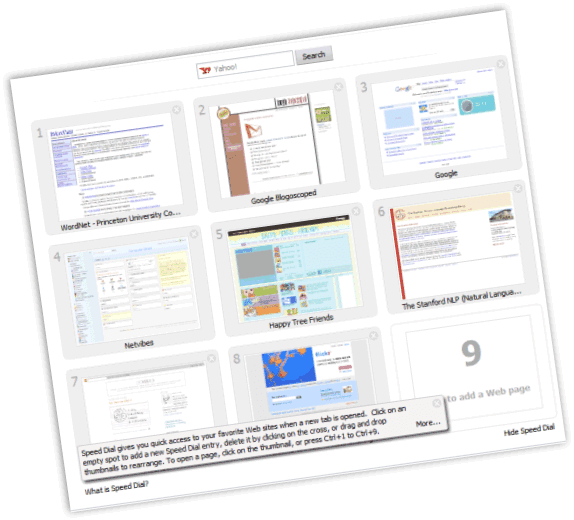
There's also a link to Opera developer tools, a list of bookmarklets that add some of the best features from Firefox's DOM Inspector and the most popular extension for developers: Web Developer Toolbar. You can inspect, edit or remove DOM nodes; view, edit or disable stylesheets; view HTTP headers and cookies. It looks pretty impressive for a JavaScript bookmarklet.
Opera finally becomes a normal browser: if you enter a query in the address bar (something that's not an URL or a single word), Opera performs a search.
Opera shows real-time thumbnails of the selected pages and lets you reload them at a custom interval so it's a cool way to monitor changes.

There's also a link to Opera developer tools, a list of bookmarklets that add some of the best features from Firefox's DOM Inspector and the most popular extension for developers: Web Developer Toolbar. You can inspect, edit or remove DOM nodes; view, edit or disable stylesheets; view HTTP headers and cookies. It looks pretty impressive for a JavaScript bookmarklet.
Opera finally becomes a normal browser: if you enter a query in the address bar (something that's not an URL or a single word), Opera performs a search.
Scan a File Using the Top Antivirus Software
If you get a file from a site you don't know very well (like a game or a screensaver), the first thing you should do is scan it using an antivirus. The problem is that your antivirus might not be very good or might not include the signature of the trojan included in the file you've just downloaded. So a good idea is to have a second opinion, but you can't install more than one antivirus (unless you disable the real-time protection).
VirusTotal is a site where you can upload a file smaller than 10 MB and it will be scanned by a large number of antivirus software (the current number is 31), including: Kaspersky, BitDefender, F-Secure, Panda. The file will not be scanned instantly, but you'll have to wait a short time (usually around one minute), depending on site's load. You'll get a report like:
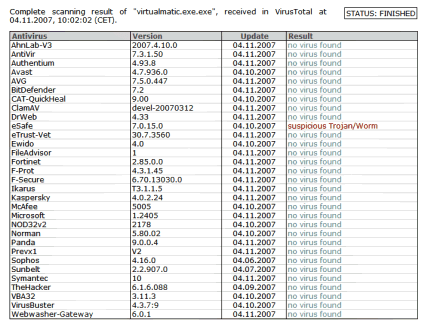
If you see conflicting responses, look at the most trustworthy engines (some tests) and at the number of engines that report a virus. In the situation depicted in the screenshot, I can safely assume that the file is clean.
The service is available by email too: send a mail to scan@virustotal.com with the subject SCAN. If you use Gmail, you'll have to rename executable files (for example, from setup.exe to setup.ex1) to be able to send them.
A similar service is Jotti's malware scan, that has a bigger limit for the file size: 15 MB, but uses less antivirus engines.
{ Thank you, Google! }
VirusTotal is a site where you can upload a file smaller than 10 MB and it will be scanned by a large number of antivirus software (the current number is 31), including: Kaspersky, BitDefender, F-Secure, Panda. The file will not be scanned instantly, but you'll have to wait a short time (usually around one minute), depending on site's load. You'll get a report like:

If you see conflicting responses, look at the most trustworthy engines (some tests) and at the number of engines that report a virus. In the situation depicted in the screenshot, I can safely assume that the file is clean.
The service is available by email too: send a mail to scan@virustotal.com with the subject SCAN. If you use Gmail, you'll have to rename executable files (for example, from setup.exe to setup.ex1) to be able to send them.
A similar service is Jotti's malware scan, that has a bigger limit for the file size: 15 MB, but uses less antivirus engines.
{ Thank you, Google! }
Open-Source OCR Software, Sponsored by Google
Google sponsors the development of an open-source OCR software at the IUPR research group. "OCRopus is a state-of-the-art document analysis and OCR system, featuring pluggable layout analysis, pluggable character recognition, statistical natural language modeling, and multi-lingual capabilities."
"The goal of the project is to advance the state of the art in optical character recognition and related technologies, and to deliver a high quality OCR system suitable for document conversions, electronic libraries, vision impaired users, historical document analysis, and general desktop use," explains Thomas Breuel, who leads the project.
The software is partly based on Tesseract, the best open source OCR engine available for now. While the project is expected to be released at the end of next year and will be used for Google's book scanning project, the team has some interesting applications in mind:
* a web service interface
* PDF, camera, and screen OCR
* integration with desktop search tools: Beagle, Spotlight, Google Desktop
The most popular OCR software are ABBYY FineReader, Omnipage, Readiris and Presto OCR, but they're pretty expensive (starting at $100). A decent solution to perform OCR on a document is Microsoft Office Document Imaging, included in Microsoft Office XP/2007. Microsoft Office OneNote 2007 also lets you OCR imported images. A free online alternative is Scanr, a site that lets you digitize documents by sending a mobile phone photo by email.
"The goal of the project is to advance the state of the art in optical character recognition and related technologies, and to deliver a high quality OCR system suitable for document conversions, electronic libraries, vision impaired users, historical document analysis, and general desktop use," explains Thomas Breuel, who leads the project.
The software is partly based on Tesseract, the best open source OCR engine available for now. While the project is expected to be released at the end of next year and will be used for Google's book scanning project, the team has some interesting applications in mind:
* a web service interface
* PDF, camera, and screen OCR
* integration with desktop search tools: Beagle, Spotlight, Google Desktop
The most popular OCR software are ABBYY FineReader, Omnipage, Readiris and Presto OCR, but they're pretty expensive (starting at $100). A decent solution to perform OCR on a document is Microsoft Office Document Imaging, included in Microsoft Office XP/2007. Microsoft Office OneNote 2007 also lets you OCR imported images. A free online alternative is Scanr, a site that lets you digitize documents by sending a mobile phone photo by email.
Towards a New Google News
Agence France-Presse (AFP) filed a suit against Google in 2005 because Google News used snippets and thumbnails from AFP's stories. Last week, the two companies settled the copyright lawsuit, without disclosing the terms of the agreement.
The interesting thing here is that Google didn't pay AFP to use snippets from its news stories (which are covered by fair use), but for the full content of the articles.
Google said the deal "will enable the use of AFP's newswire content in innovative, new ways that will dramatically improve the way users experience newswire content on the Internet".
Last year, Google made a similar deal with Associated Press. "The license in this agreement provides for new uses of original AP content for features and products we will introduce in the future. We are very excited about the innovative new products we will build with full access to this content," said at that time a Google spokeswoman.
So we know that Google builds a new version of Google News that includes full content from AP and AFP. Currently, Google News automatically aggregates news stories from thousands of sources, groups related news and shows snippets and thumbnails, similar to the web search results.
We also know that there's a product called Universal Search, that could integrate news results into standard search results. Google Blog Search and Google News seem closer than ever.
Philipp Lenssen found that Google tested a prototype which allows "other news sources, and organizations and individuals mentioned in news stories to debate specific points."
So how do you think the new Google News will look like, will Google choose the Yahoo News path and what do you expect to see in an "universal search"?
The interesting thing here is that Google didn't pay AFP to use snippets from its news stories (which are covered by fair use), but for the full content of the articles.
Google said the deal "will enable the use of AFP's newswire content in innovative, new ways that will dramatically improve the way users experience newswire content on the Internet".
Last year, Google made a similar deal with Associated Press. "The license in this agreement provides for new uses of original AP content for features and products we will introduce in the future. We are very excited about the innovative new products we will build with full access to this content," said at that time a Google spokeswoman.
So we know that Google builds a new version of Google News that includes full content from AP and AFP. Currently, Google News automatically aggregates news stories from thousands of sources, groups related news and shows snippets and thumbnails, similar to the web search results.
We also know that there's a product called Universal Search, that could integrate news results into standard search results. Google Blog Search and Google News seem closer than ever.
Philipp Lenssen found that Google tested a prototype which allows "other news sources, and organizations and individuals mentioned in news stories to debate specific points."
So how do you think the new Google News will look like, will Google choose the Yahoo News path and what do you expect to see in an "universal search"?
AdSense for Newsletters?
Google tested a way to embed contextual ads in email newsletters, but it didn't release this feature to the public. A new patent ("Serving content-targeted ADS in e-mail, such as e-mail newsletters"), granted to Google today, describes some details about the process:
So their system relies on images or dynamically-generated image maps that serve ads related to the content of the newsletter. But many mail clients and webmail apps also block embedded images (unless you explicitly allow them).
A post from Search Engine Roundtable mentioned last year that "some Google AdSense publishers are allowed to place ads within email newsletters or other emails, with permission from Google". An advertiser confirms: "We have had AdSense ads in our newsletters for over a year now. These ads come in various formats and are essentially served by an image server".
Serving content-targeted ads in e-mail newsletters is a potential source of a large number of additional quality page-views for advertisers. (...) Regardless of the system used to serve ads with e-mail, such as e-mail newsletters, it may be desirable to (i) obtain e-mail content information so that useful, content-relevant, ads may be served, and (ii) provide ads in a format that can be rendered on and supported by a wide variety of e-mail clients/readers, or at least prevalent e-mail clients/readers. This may be challenging since many, if not most, of the more popular Web-based e-mail clients strip out IFRAMEs and JavaScript. (...)
The present invention may be used to serve content-targeted ads with e-mail messages, such as HTML e-mail messages, and may do so without needing to use IFRAMEs or JavaScript. The present invention may do so by (i) having the document publisher include a unique content identifier in the content, (ii) having a client device pass the unique content identifier to a content-relevant ad server in a content-relevant ad request, and (iii) having the content-relevant ad server use the unique contend identifier to identify previously registered content for purposes of determining content-relevant ads.
So their system relies on images or dynamically-generated image maps that serve ads related to the content of the newsletter. But many mail clients and webmail apps also block embedded images (unless you explicitly allow them).
A post from Search Engine Roundtable mentioned last year that "some Google AdSense publishers are allowed to place ads within email newsletters or other emails, with permission from Google". An advertiser confirms: "We have had AdSense ads in our newsletters for over a year now. These ads come in various formats and are essentially served by an image server".
ToDo List for Google Calendar
Update (July 27 2007): As always with these Greasemonkey scripts, any minor change in a site's code can make the script stop working. The ToDo list described below doesn't work anymore, so you could try a similar one.
Google Personalized Homepage has a to-do gadget, who'd be be better suited in Google Calendar. As there's no option to add gadgets in Google Calendar, someone created an even simpler version as a Greasemonkey script.
While you can't add priorities, sort the events by date or change their order, it's handy to have a list of events next to the calendar. The ToDo list is saved in Google Calendar as fake events, so you'll be able to see it if you use other computers (you'll need to have Firefox + Greasemonkey, though).
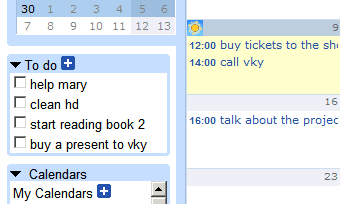
How to add the ToDo list? First install Greasemonkey for Firefox, restart the browser and then install this script.
Google Personalized Homepage has a to-do gadget, who'd be be better suited in Google Calendar. As there's no option to add gadgets in Google Calendar, someone created an even simpler version as a Greasemonkey script.
While you can't add priorities, sort the events by date or change their order, it's handy to have a list of events next to the calendar. The ToDo list is saved in Google Calendar as fake events, so you'll be able to see it if you use other computers (you'll need to have Firefox + Greasemonkey, though).

How to add the ToDo list? First install Greasemonkey for Firefox, restart the browser and then install this script.
A Batch of Gmail Accounts, Accidentally Disabled

Next time when you can't access Gmail, be happy that Gmail is down only for a few minutes. Other people have to live days without their Gmail accounts (and you know it's hard to do that).
Last week, the Gmail team realized that a bunch of spammers found a temporary home at gmail.com. Says the Gmail team: "We have been actively investigating a batch of accounts that were accidentally disabled and are currently in the process of re-enabling these accounts. This error occurred in an effort to target a large network of spammers to keep them out of the Gmail system and keep your inbox free from spam. We apologize for this inconvenience and appreciate your patience as we re-enable these accounts as quickly as possible."
Collateral damages, you'll say. But not if you're one of the poor souls who had the misfortune to be the target of Gmail's team raid. While some of the accounts were disabled, others didn't have links to email attachments.
My account is readable.. like i can logon. but i can't download any of the attachments. i have two huge presentations coming up and all the files are on my account. i trust google more than a usbkey soo i always have my files on my account. now i can't even get them.. and i can't get any one to send them to me. so please please fix it soon. "lockdown on sector 6" is what i get and i abide by google's terms of use.
Benedikt ("benedictus" means "blessed" in Latin), the wise soul from Gmail's Google Group, saves the day:
I think this extremely unfortunate event shows us the danger of having all the important information in one place, a place that depends on the functionality of one large software package, such as GoogleMail. (...)
What we experience right now is such a failure and most of the posts in this topic that have been posted before this one show us the consequences that can have. So let us hope that the capable engineers of Google will succeed in restoring GoogleMail's full functionatlity as they have succeded in building up the virtual world of collaboration, information and communication that has made Google what it is today.
While Gmail is a useful web application, you shouldn't use it to store mission-critical files or information. And if you do, make sure you have backups: store your files on different storage mediums, forward your Gmail messages to other accounts or pray that Gmail team doesn't have a bad day and disables your account. If you see an error message like "Lockdown in sector 4 (or 6)", complain to Google.
Google says they promptly re-enabled the affected accounts, but there are still people who can't access Gmail. And might "move their operations" to other sites, if the Gmail team continues to treat them like that.
I've been locked out of my original email for a full 7 days come midnight. I'm also locked out of anything google associated, so I can't post new content to my blog, nor check AdSense income. I thought I would have to wait the standard 5 days and now I realize my account wasn't having password issues, this was a long standing issue that it seems they knew about.
Which makes me upset enough to move my operations from google; I hope everyone else does the same...this is the only free email service I have known with regular outages, shutdowns and no customer support. The last time I lost access to my email was 3/14/06, my birthday no less...luckily, I got it back in 24 hours. Now, it's been 7 days.
Eric Schmidt's Confessions
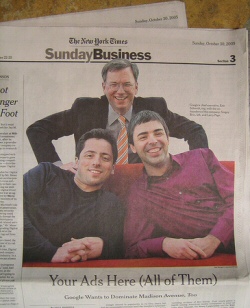 Photo from NY Times, CC-licensed by Jakob Lodwick.
Photo from NY Times, CC-licensed by Jakob Lodwick.Fred Vogelstein publishes an interview from 2005 with Eric Schmidt, Google's CEO. It's an exciting conversation that reveals a lot from Google's internal combustion, the long debates between the three key people who run Google, how decisions are made and a difficult moment when Google was very close to split-up.
"Sergey is brilliant, pulsing, right. Larry is brilliant and deep. So Sergey is -- what is it, a supernova, he's exploding his ideas. So with Sergey you listen, you know, he'll be sitting there and he'll be doing something random, right, not paying attention at all, and then all of a sudden he makes this comment that is distinctly different from everyone else and is very incisive. It is how his brain works. Larry would write a 30-page paper on his GPS idea overnight and not sleep."
In the interview, Mr. Schmidt defines himself as the "normal person" from Google's triumvirate.
"I used to give this speech about how you control risk, and the best way to control risk is to have the smartest people working on the problem, and businesses are about risk. An example would be in my first year the question had to do with the development of these advertising networks. Overture was doing well. Would we partner with them? Would we compete with them? We had some preliminary conversations partnering with them. They wanted to buy us. And there were a number of times when I frankly had no idea what to do. But the solutions didn't come as a result of me sitting in a room and inventing it. I don't think Larry and Sergey sat in a room by themselves either. It was an iteration that involved the interactions of five or ten people over a period of time. And the characteristic of such group decisions done right is enormous buy-in."
"The most acute disagreement was over the original deal with AOL (in 2002). The reason was that Google did not have enough cash to fulfill the guaranteed payout in the contract (in the future). And the actual sequence is quite interesting because you see the beginnings of the management structure. So in the first place, the deal itself was a very good idea, we all agreed to it. Because the AOL people were very smart, and because Google was a new business, they negotiated very, very cleverly. (...) And I remember one day where we argued to the point where I actually stopped the argument. I thought it would split the company. It was the closest point -- and this is now four years ago, three and a half years go -- it was the closest point I ever saw literally the company falling in two."
Batch Upload Files to Google Docs
You'd think that Google considered Docs & Spreadsheets important enough to make it easy to import files. Or to export files. You can do that one file at a time, but it becomes tiresome if you have a lot of files.
Fortunately, the latest version of Google Toolbar for Firefox has a feature that lets you drag and drop files to your browser and they are automatically uploaded to Google Docs. To upload more files at a time, go to Windows Explorer or other file manager, select your files and drag them in Firefox.
To activate the feature, to go to Google Docs & Spreadsheets after installing the toolbar. You'll get a prompt that asks you if you want to enable the feature. Alternatively, click on Settings / Options and enable "Docs & Spreadsheets".
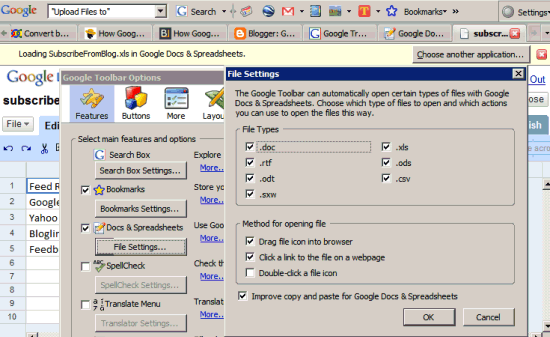
Related:
Upload files using drag and drop in Firefox
Fortunately, the latest version of Google Toolbar for Firefox has a feature that lets you drag and drop files to your browser and they are automatically uploaded to Google Docs. To upload more files at a time, go to Windows Explorer or other file manager, select your files and drag them in Firefox.
To activate the feature, to go to Google Docs & Spreadsheets after installing the toolbar. You'll get a prompt that asks you if you want to enable the feature. Alternatively, click on Settings / Options and enable "Docs & Spreadsheets".

Related:
Upload files using drag and drop in Firefox
Google, the Supercomputer
BusinessWeek had a nice collage titled "The many faces of Google" that illustrated 8 facets of Google: search engine, innovation machine, ad broker, media mogul, world's biggest computer, phone company, a provider of better Internet and an artificial intelligence system. While some of these perspectives are speculations or just future plans, it's interesting to see Google as a supercomputer you have limited access to.
The New York Times estimated last year that the Googleplex and its server farms contain 450,000 servers. "The rate at which the Google computing system has grown is as remarkable as its size. In March 2001, when the company was serving about 70 million Web pages daily, it had 8,000 computers, according to a Microsoft researcher granted anonymity to talk about a detailed tour he was given at one of Google's Silicon Valley computing centers. By 2003 the number had grown to 100,000."
Most people still think of Web sites such as Google as places to go. Wrong. That's the old media model. In reality, every click is a command for some computer somewhere in the world. (...) Indeed, CEO Eric Schmidt says that Google essentially is a huge, distributed supercomputer "doing all sorts of things over a fiber-optic network that eventually are services available to end-users." Before long, Googling will mean not just searching for something, but getting ALMOST anything done online.
The New York Times estimated last year that the Googleplex and its server farms contain 450,000 servers. "The rate at which the Google computing system has grown is as remarkable as its size. In March 2001, when the company was serving about 70 million Web pages daily, it had 8,000 computers, according to a Microsoft researcher granted anonymity to talk about a detailed tour he was given at one of Google's Silicon Valley computing centers. By 2003 the number had grown to 100,000."
Subscribe to:
Comments (Atom)
Labels
Web Search
Gmail
Google Docs
Mobile
YouTube
Google Maps
Google Chrome
User interface
Tips
iGoogle
Social
Google Reader
Traffic Making Devices
cpp programming
Ads
Image Search
Google Calendar
tips dan trik
Google Video
Google Translate
web programming
Picasa Web Albums
Blogger
Google News
Google Earth
Yahoo
Android
Google Talk
Google Plus
Greasemonkey
Security
software download
info
Firefox extensions
Google Toolbar
Software
OneBox
Google Apps
Google Suggest
SEO Traffic tips
Book Search
API
Acquisitions
InOut
Visualization
Web Design Method for Getting Ultimate Traffic
Webmasters
Google Desktop
How to Blogging
Music
Nostalgia
orkut
Google Chrome OS
Google Contacts
Google Notebook
SQL programming
Google Local
Make Money
Windows Live
GDrive
Google Gears
April Fools Day
Google Analytics
Google Co-op
visual basic
Knowledge
java programming
Google Checkout
Google Instant
Google Bookmarks
Google Phone
Google Trends
Web History
mp3 download
Easter Egg
Google Profiles
Blog Search
Google Buzz
Google Services
Site Map for Ur Site
game download
games trick
Google Pack
Spam
cerita hidup
Picasa
Product's Marketing
Universal Search
FeedBurner
Google Groups
Month in review
Twitter Traffic
AJAX Search
Google Dictionary
Google Sites
Google Update
Page Creator
Game
Google Finance
Google Goggles
Google Music
file download
Annoyances
Froogle
Google Base
Google Latitude
Google Voice
Google Wave
Google Health
Google Scholar
PlusBox
SearchMash
teknologi unik
video download
windows
Facebook Traffic
Social Media Marketing
Yahoo Pipes
Google Play
Google Promos
Google TV
SketchUp
WEB Domain
WWW World Wide Service
chord
Improve Adsence Earning
jurnalistik
sistem operasi
AdWords Traffic
App Designing
Tips and Tricks
WEB Hosting
linux
How to Get Hosting
Linux Kernel
WEB Errors
Writing Content
award
business communication
ubuntu
unik